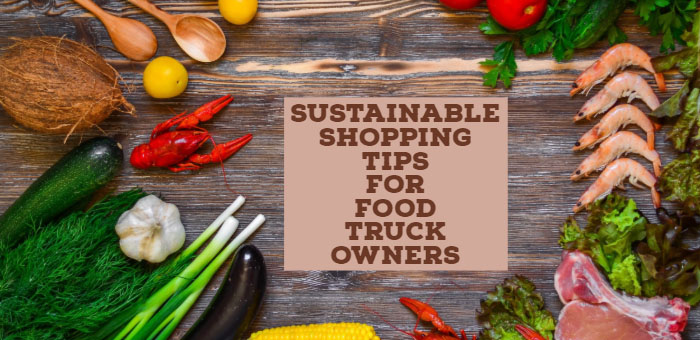Shopping for organically grown foods can be as confusing for food truck owners as it is for anybody else. The different legal terms and jargon that companies use to market their foods can make it seem like their products are sustainable and humane, but it takes a detective to really figure out whether the food is what the farms say it is. We put together this handy list along with these sustainable shopping tips to help you be as educated a shopper as possible.
Sustainable Shopping Tips For Food Truck Owners
Knowing food terminology will help you navigate through product purchasing and help you decide what’s worth paying extra for, and what’s worth avoiding.
Natural for non-meat products (FDA)
In 1989, the FDA issued a definition for natural, stating that it meant nothing artificial or synthetic has been included in or added to a food that would not normally be expected to be in the food.
Natural for meat products (USDA FSIS)
Can’t contain any artificial flavor or flavoring, coloring ingredient, chemical preservative or any other artificial or synthetic ingredient. In addition, the product could only be minimally processed (FSIS, 2006). Under this ruling, the definition of minimally processed includes:
- Traditional processes used to make food edible or to preserve it or make it safe for human consumption, or
- Physical processes that do not fundamentally alter the raw product and/or that only separate a whole, intact food into component parts, e.g., grinding meat, separating eggs into albumen and yolk, and pressing fruits to produce juices.
Naturally Raised (USDA AMS)
Naturally raised on livestock and meat derived from livestock would mean that:
- A) no growth hormones were administered to the animals
- B) no antibiotics were administered to the animal
- C) no animal by-products were fed to the animals
Free-Range Eggs
There are no legal standards in free-range egg production. Typically, free-range hens are uncaged inside barns or warehouses and have some degree of outdoor access, but there are no requirements for the amount, duration or quality of outdoor access. Since they are not caged, they can engage in many natural behaviors such as nesting and foraging.
There are no restrictions regarding what the birds can be fed. Beak cutting and forced molting through starvation are permitted. There is no third-party auditing.
Free-Range Chicken
The USDA allows for any chicken raised with access to the outdoors to be labeled free-range. Nowhere does it state that the chickens have to actually go outdoors; access is the only legal binding verbiage of that rule.
They may still be raised in the same overpopulated poultry house-type production and be labeled free-range. Certified organic chickens may also be raised like this.
Cage-Free
As the term implies, hens laying eggs labeled as cage-free are un-caged inside barns or warehouses, but they generally do not have access to the outdoors. They can engage in many of their natural behaviors such as walking, nesting and spreading their wings. Beak cutting is permitted. There is no third-party auditing.
5 Sustainable Shopping Tips For Farmers Markets
More and more food truck owners are going straight to the source to get their produce, meats, breads, and herbs. Farmers markets are one of the easiest ways to assess the quality of several farms in one morning. Here’re some tips for those of you first-timers.
- Get there early. Check the farmer’s market website to see what time the market opens. Good farmers have very devoted fans and may sell out of food.
- Ask questions. Get to know your farmer, and don’t hesitate to ask about his or her farming methods, tips for cooking or chemicals they may or may not use.
- Look for certified organic or certified sustainable farmers. Certification means the farmers use natural methods to avoid chemicals that could harm your health and the environment. Learn more about what organic means here, and why organic foods are better for you here.
- Bring your own reusable bags. Most farmers markets don’t have grocery bags. Don’t forget the chilled bags for your meats.
- Check out what’s in season. Consult with a harvest calendar to see what’s in season, and then plan your menu accordingly. But don’t be afraid to try new things. Farmers are helping to keep heirloom varieties around, most of which aren’t sold at a typical grocery store anymore, so they may look weird at first glance.
The Bottom Line
The habits you have surrounding grocery shopping make a much larger impact on the environment than you may realize. Use these sustainable shopping tips the next time you hit the grocery shopping!
If you have any sustainable shopping tips you think we missed? Share your thoughts on this topic in the comment section, our food truck forum or social media. Twitter | Facebook





